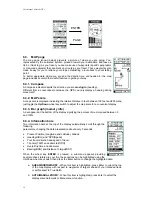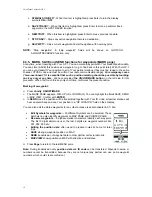
User Manual Albrecht GP 1
4
1.
Introduction
1.1.
General warning notes
•
The
PM
R-GPS should be used as an aid in navigation. The unit is not intended to replace
basic navigational procedures and common sense.
•
When using this device in a vehicle, use it only when the vehicle is stopped and it is safe to do
so. Operating the unit while driving is dangerous and could result in an accident or collision. It
is more important to keep your eyes on the road and hands on the wheel.
•
Do not operate the transceiver in Countries where PMR 446 is not allowed. Apply for individual
licence where necessary.
•
Remove the batteries from the unit if it is not expected to be used for long periods.
This will eliminate the possibility of chemicals leaking from the batteries and corroding the
unit.
•
Avoid exposing the unit to water or extremes of temperature.
•
Do not use this device in or near a mining facility, which uses remotely triggered explosives
or in areas labeled “Blasting Area”. Premature or accidental detonation may result.
•
Do not attempt to modify or in any way increase the output of this transceiver. Its output is
designed to meet the legal limits set by the
EU Standard
s.
•
Do not use this device or change its batteries in potentially explosive atmospheres as sparks
in such areas could result in an explosion.
•
Turn your transceiver off wherever posted notices restrict the use of radios or cellular tele
phones. Facilities such as hospitals may use equipment that is sensitive to RF energy.
•
Turn your transceiver off on board aircraft when requested to do so.
•
Do not place your radio in front of a vehicle’s air-bag. If the air-bag deploys, it could propel
the unit like a projectile causing severe injuries.
1.2.
Important to know
•
Never attempt to charge alkaline or other “normal” dry cell batteries. When recharging, use only
Albrecht’s approved and recommended 1300 mAh rechargeable NiMH batteries (order Nr. 29723)
and chargers. Use of the charger with other batteries can cause damage to your
PM
R-GPS unit.
Other types of batteries may burst and cause personal injury. Nickel-Cadmium batteries are not
receommended because of their lower capacity and the higher risk of “Memory Effect” compared
to NiMH batteries..
•
Avoid installing the
PM
R-GPS unit in an area where it may be subjected for prolonged periods of
time to direct sunlight or temperatures below -
4°
F (-20°C) or above 14
0°
F (6
0°
C).
•
Keep the antenna at least 2.5 cm away from your head and body when transmitting and do not
use your
PM
R-GPS transceiver with a damaged antenna.
•
Use the rubber covers as protection of sockets when not in use.
1.3.
Where is the radio part allowed to be used?
Use of this unit is allowed within the EU cou Iceland, Hungary and Switzerland, except Italy,
and Norway. In Belgium, residents must apply for an individual licence, while use of PMR 446 is free
for travellers up to 3 months. In Norway and Italy the PMR 446 frequencies are still in use by other
services. In France, transmitting on channels 1 and 2 is not yet allowed for the same reason. If You
intend to use the radio in countries not listed on the gift box and in our “Declaration of Conformity”,
You should ask the telecommunications authority for a licence in advance. You may also obtain latest
informations from the Albrecht homepage
http://www.albrecht-online.de
, where You can also
download the latest conformity declaration version and country lists.
1.4.
Reducing „Memory Effect“ of rechargeable batteries
The recommended 1300 mAh NiMH (Nickel-Metal-Hydrid) batteries (1 set = Order Nr. 29723) are
almost free of the so called „Memory Effect“, which is more common to normal NiCD battery types.
Summary of Contents for GP 1
Page 33: ...User Manual Albrecht GP 1 33 ...
Page 34: ...User Manual Albrecht GP 1 34 ...
Page 35: ...User Manual Albrecht GP 1 35 ...
Page 36: ...User Manual Albrecht GP 1 36 ...




































